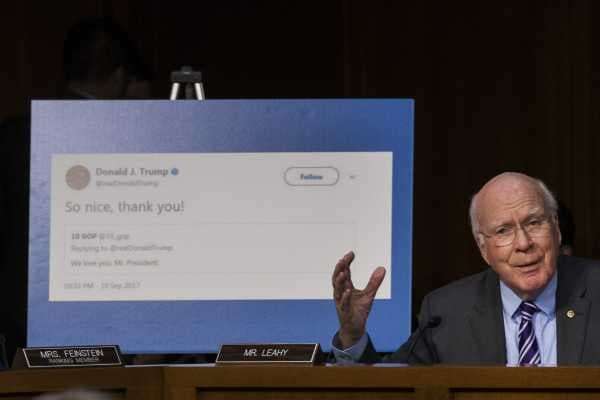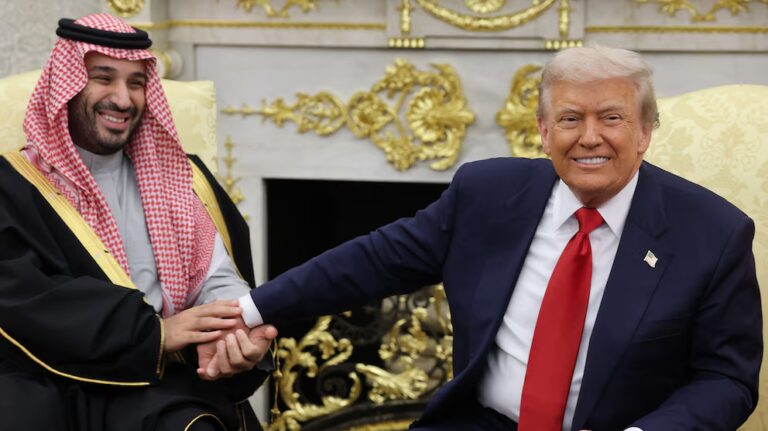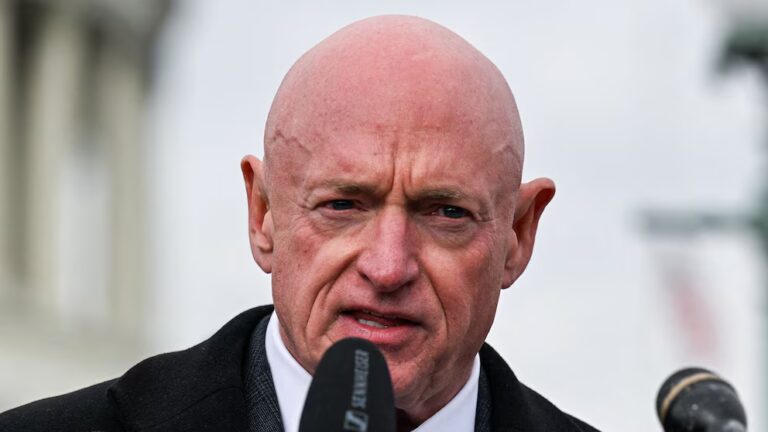
Special counsel Robert Mueller on Friday handed down multiple indictments of Russian individuals and companies for the country’s interference in the 2016 US elections. “NO COLLUSION,” the White House responded.
President Donald Trump subsequently fired off several tweets commenting on the matter, ranging from claiming to never have doubted Russian election meddling (he did), blaming the Florida shooting on the Russia investigation (that’s wrong), and musing what a great presidential candidate he was (¯_(ツ)_/¯). But beyond tweeting, there’s more that the president — and the federal government as a whole — should be doing to stop Russia from meddling in US politics and elections.
Given the success of its campaign to interfere in the 2016 election, there’s little doubt that Russia will try its hand at swaying elections in 2018 and beyond. There is already evidence that the #ReleaseTheMemo campaign to make public the now-infamous Nunes memo — which alleges abuses of power by the FBI during its investigation into the Trump campaign’s ties with Russia — was amplified by Russian bots and trolls online.
Dan Coats, director of national intelligence, told the Senate Intelligence Committee last week that Russia is likely to interfere again in the 2018 midterms. “There should be no doubt that Russia perceives that its past efforts have been successful and views the 2018 midterm US elections as a potential target for Russian influence operations,” Coats, the nation’s top spy, said. “Frankly, the United States is under attack.” America knows Russia is coming, so what’s the plan now?
I reached out to nine national security experts to ask them just that. They agreed that any measure must be a concerted effort that involves the White House, multiple federal agencies, state and local officials, private companies, the media, and citizens. Even so, there are no guarantees.
The responses, edited for clarity and style, are below.
Lawrence Norden, deputy director, Democracy Program at the Brennan Center for Justice at New York University School of Law
I want to focus on two areas. First, protecting our election infrastructure: voter registration systems, voting machines, tally servers, election night reporting, etc.
A lot has been done since 2016 to increase election system security, but a lot more could and should be done. Most importantly, we need to replace outdated systems and upgrade security practices. That includes replacing paperless electronic voting machines so there is a voter-marked paper record of every vote, and conducting post-election audits to compare the paper records to software generated results.
There are two bills in Congress — the Secure Elections Act in the Senate and the PAPER Act in the House — that have significant bipartisan support and would get states and localities money to help ensure this happens nationally. Unfortunately, neither has received a committee hearing or vote yet.
Second, when it comes to the kind of stuff detailed in the Mueller indictment [on Friday], there is much that can be done to make it more difficult for foreign money to get in our elections. We could start in Congress by passing the Honest Ads Act, sponsored by Sens. Amy Klobuchar (D-MN), John McCain (R-AZ), and Mark Warner (D-VA), which would bring much more transparency to political ads on the internet by putting them under the same regulatory regime as broadcast TV and radio, and explicitly ban the purchase of some political ads by foreign nationals.
We could also pass the Disclose Act, which would help end secret spending by dark money groups (which can end up being conduits to foreign spending) and ban spending by corporations that are foreign-owned or -controlled.
Congress hasn’t acted on either of these bills this year, but the internet companies that sold ads to Russians over the past few years can voluntarily adopt the Honest Ads Act’s provisions. They’ve taken some steps in that direction, but there is certainly more they could do.
Matthew Waxman, faculty chair, National Security Law Program at Columbia University
Part of the solution lies in hardening our election systems against hacking, such as assisting states in protecting voting infrastructure and making our political system more resilient to Russian influence operations.
The private sector, including social media companies, [has] a big role to play here too. The government can provide them assistance too, and individual companies should continue working to make their platforms less susceptible to abuse.
But the adversary is adaptive too, and we need to show resolute political unity in condemning Russian actions and impose real costs on them in response. The most recent special counsel Mueller indictments against Russians is helpful in documenting and detailing some of Russia’s efforts, though these were only just a very small part of a much broader Russian campaign.
The president of the United States still hasn’t even spoken clearly on this issue or imposed penalties, like tough sanctions or less overt measures that strike at Putin politically, instead issuing muddled messages that play into Russia’s hands.
Russia probably views its past efforts as successful, without facing severe consequences in return, and it will be upping its game for the next time. The Obama administration and congressional leaders also failed to take strong enough action during the past election. Acknowledging past mistakes or missed opportunities would help make sure they aren’t repeated.
But President Trump is now constitutionally obligated to defend our democracy, and unless he shows real leadership on this issue — which doesn’t appear likely — we remain very vulnerable.
Glenn Carle, former CIA officer and deputy officer on the National Intelligence Council
I guess there are two aspects to the response that the US government should take, at least. One is a straightforward counterintelligence work of trying to detect and then stop foreign intelligence operations — in this case, Russian ones. And they would be either human recruitment, which are classic things, or covert action or info operations, which is the Russian interference specifically that we’re thinking about.
The first one is straightforward: You just try to detect intelligence work by foreign governments and stop it. The second one, you do take the same steps in trying to detect. But how you stop this then gets to the prophylactic measures, which would be to harden voting procedures, harden them from meddling, sensitizing officials for signs of meddling, and measures that they should take at the local, regional, and state levels to assure the integrity of the electoral process
What one does with respect to disinformation, this has always existed, but with new technologies it’s exponentially more effective to do and harder to counter. Up until the internet, with the rise of Facebook and similar social media, you could plant commentary by having officials or people of note make statements or write articles, you could plant stories and have them picked up to create different attitudes, you could organize rallies and fund political parties.
With social media now, any individual theoretically can have as much impact as a major broadcast network did until now. So how one challenges that or stops that, I don’t think any of us really knows.
Claire Finkelstein, director, Center for Ethics and the Rule of Law at the University of Pennsylvania
The Mueller indictments of 13 Russian agents and the detailed accounting of their election interference is the first step in securing the 2018 elections. The biggest danger we face at present is that we have an administration that has been denying the existence of Russian interference in our political system.
Friday’s indictments present incontrovertible evidence that the Kremlin mounted a large-scale, concerted attack on American democracy, one that was coordinated with certain US nationals, whether witting or unwitting partners. US intelligence and law enforcement officials cannot protect us against threats if our own commander in chief does not acknowledge such threats.
If resistance in the administration were to subside as a result of this detailed evidence, we could take a number of steps that would help secure the 2018 election. First, Congress could pass legislation, with presidential encouragement, that would require transparency of all funding sources for social media advertisements and political messaging.
Second, Congress could require social media sites to engage in federal licensing for all foreign-sourced social media accounts that seek to advertise or disseminate information above a certain monetary level of promotion.
Third, states should be encouraged, or required, to take action to protect their registration software as well as their electronic ballots. It is essential that states use backup paper ballots to verify election results in case of recounts or electoral irregularities.
Finally, the president should impose greater sanctions on Russia than have been imposed thus far, as well as to enforce those already imposed. The administration must work with the UN Security Council and NATO to coordinate action on behalf of democratic nations subject to Russian election interference.
Now that the evidence of Russian interference is fully established, failure on the part of the president to act to curtail Russian covert operations targeting US public opinion must be considered complicity with foreign interference in our electoral system, which potentially forms the basis for impeachment proceedings as a betrayal of US security interests.
Adam Segal, chair in emerging technologies and national security, Council on Foreign Relations
The responses fall in three boxes. First, there is the calling out of the Russians, punishing them for previous attacks, and deterring them for future ones. The recent Mueller indictments are a step in the right direction. While the Russians mentioned in the indictment will never see a US court, the United States is demonstrating to Russia, and others, that it can attribute the interference and hopefully make them think longer about whether it is useful to launch future attempts.
Actually sanctioning Russian actors would be even more useful, but with the White House unwilling to follow through with sanctions already in place, that seems unlikely.
The federal government can also make us a safer on the defensive side. Again, the White House has demonstrated that it does not take this seriously, but there are important efforts on the Hill to strengthen the cybersecurity of electoral systems, for example, the $1 billion effort the Democrats introduced this week. There are also efforts to expose the Russians use of trolls, bots, and ads on social media.
The third box is the hardest given the high degree of partisan rancor now, but it would involve efforts to educate citizens on how to identify fake news. Again, the White House shows no interest in this, but as the George Washington political scientist Henry Farrell notes, you cannot have a well-functioning democracy without shared facts.
Michael Sulmeyer, director, Belfer Center’s Cyber Security Project at Harvard Kennedy School
The United States must have a reconnaissance and force posture so that our cyber mission forces can take action abroad to disrupt and degrade efforts to interfere in our elections. These steps should be readied in concert with efforts to deter Russia from more meddling, but thus far, there is little evidence that the Russians are deterred. Quite the contrary, they seem emboldened, and all signs point toward more Russian efforts to create confusion and chaos ahead of the midterm elections.
At Harvard’s Belfer Center, we have been working hard to address a related challenge: how to improve defenses and resilience in the United States to withstand this kind of meddling. Recently, we released a playbook to help campaigns better defend themselves.
Last week, we launched another playbook, this time for state and local officials involved in administering elections, with practical solutions to improve their cybersecurity. Both products are based on significant field research by a diverse set of faculty, students, and outside experts, who engaged actively with election administrators across the country.
These self-help measures are essential today. But as we look ahead, we also must combat the related challenge of Russian information operations that rely less on hacking and cyber intrusions, and more on manufacturing, releasing, and proliferating (sometimes fake) content in strategic ways.
Doing so requires not just the responsibility of the federal government, but also of the companies whose products are being used and abused to facilitate the spread of this information. Everyone needs to step up their game to push back on these egregious attempts to meddle in our elections and undermine our democratic processes.
Paul David Fidler, law professor, Indiana University
We, as a nation, need leadership, bipartisanship, and citizenship to confront the menace of foreign governments interfering with our democratic elections. At the moment, we are suffering in all three.
The Trump administration has shown no leadership, as evidenced again by Trump picking a fight over “collusion” with the FBI after the indictments issued last week. Instead of leadership in the face of a direct threat to the manner in which this republic is governed, we get more petulant tweets.
Countering the threat of foreign interference with our election process also requires the two main political parties to use their networks and influence to warn about the threat and prepare people for what’s already started and is coming with more force as November 2018 approaches. Such solidarity between the main political parties on this issue would help mitigate the fissures in this country the Russians have excelled at exploiting.
Finally, we are a self-governing people. Those who vote, the citizens, must rally to protect our deliberative democracy from foreign manipulation. Too many of us have become servile to the shallowness of social media.
The citizen’s responsibility to assess the facts and calibrate what politicians claim is not a burden — it is integral to the liberty a free people should cherish and fiercely guard against the machinations of true tyrants.
Kenneth Geers, senior fellow, the Atlantic Council’s Cyber Statecraft Initiative
The federal government is enormous, and there are vulnerabilities everywhere. The closer you get to national security systems, the more professionalism there is on digital attack and defense. However, even the Department of Education offers a juicy target for espionage, if only as a stepping stone for other operations.
First, hire the smartest IT professionals you can, because a few true experts are better than a hundred neophytes. Second, decision-makers need to understand the “cyber” dimension — or the human-machine dynamic. This was at the root of our failure to see what the Russians were up to in our 2016 election. In fact, the Russians have argued for years that the West has been focused too narrowly on the technical aspects of computer security, and that we have not given enough attention to information security — so you can’t say they didn’t warn us.
The trouble with digital arms control is that you can’t easily define a “cyberweapon,” and it’s hard to prohibit something that you can’t inspect — like chemical and nuclear warheads. Governments simply move too slow to keep up with information technology. As soon as they master Facebook and Twitter, something else will have taken their place.
Still, the United States is in an enviable position vis-à-vis many other countries, because we have the political, economic, and military might to deter most nations from launching similar information operations against us. But Russia and China have nuclear weapons, so they can hack at will, as computer network operations nearly always fall below the threshold of a true national security crisis. But now that we have officially blamed Russia for this attack, it will be interesting to see whether Washington can do something to prevent it from happening again.
The internet poses fundamental challenges to national sovereignty, law enforcement jurisdiction, and much more. Cybersecurity is an international problem that requires an international solution. The best place to see progress on this issue is within the European Union and NATO, already the strongest political and military alliances on Earth.
Eventually, we will have to ban cyber espionage within the NATO alliance, since that is always a precursor to cyberattack. Then, in theory, alliance members can identify bad guys much faster and work together to deter them, proactively through intelligence sharing, and reactively through joint investigations.
Paulo Shakarian, director, Arizona State University Cyber-Socio Intelligent System Laboratory
If the US had no Navy and container ships got decimated, you wouldn’t be surprised. If the US had no missile defense and Washington, DC, got bombed, you probably wouldn’t be surprised either.
The capabilities of the US to detect and operate against foreign agents using social media is severely hamstrung by various legal requirements and political fears of government monitoring. The Russians realized this and decided to launch a military campaign in a sphere where it has become taboo for our government to even monitor in a serious manner.
Further, the Russians also know that any US institution attempting to respond could potentially draw the ire of right-to-privacy advocates on the left and the supported political candidates on the right. They engineered an attack where existence of the attack is debatable and our response to the attack would beget an internal political argument.
Multiple government programs funded by agencies, such as the Defense Advanced Research Projects Agency (DARPA), the Office of Naval Research, and the Army Research Office, have established the science of understanding social media.
We have some of the top scientific minds in the world on this topic in the US. However, we lack the right legal structure and political will to take big steps and operationalize this technology. In other words, we have the engineers who can build the fighter jets but lack the airstrip, pilots, and everything else needed to make it work in real life. Countries like Russia and China — who are totally unencumbered by our constraints — have found a golden opportunity.
Sourse: vox.com






